初中英语语法知识—动词的解析
- 格式:doc
- 大小:41.00 KB
- 文档页数:8
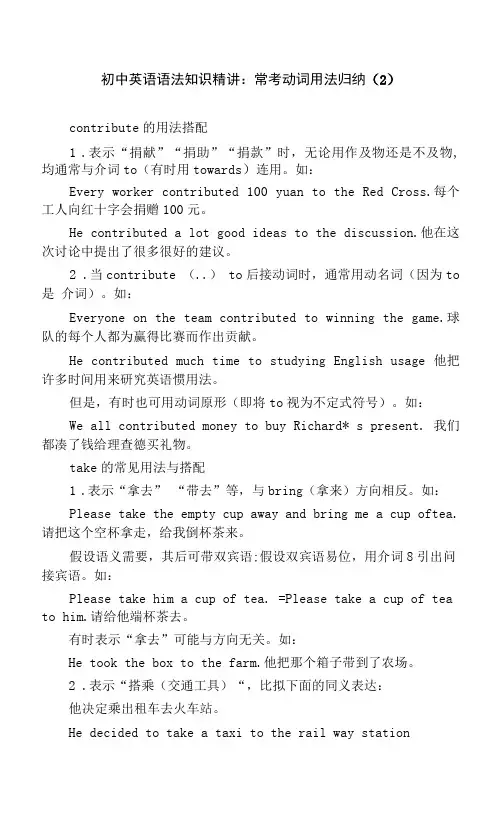
初中英语语法知识精讲:常考动词用法归纳(2)contribute的用法搭配1.表示“捐献”“捐助”“捐款”时,无论用作及物还是不及物, 均通常与介词to(有时用towards)连用。
如:Every worker contributed 100 yuan to the Red Cross.每个工人向红十字会捐赠100元。
He contributed a lot good ideas to the discussion.他在这次讨论中提出了很多很好的建议。
2.当contribute (..)to后接动词时,通常用动名词(因为to 是介词)。
如:Everyone on the team contributed to winning the game.球队的每个人都为赢得比赛而作出贡献。
He contributed much time to studying English usage 他把许多时间用来研究英语惯用法。
但是,有时也可用动词原形(即将to视为不定式符号)。
如:We all contributed money to buy Richard* s present. 我们都凑了钱给理查德买礼物。
take的常见用法与搭配1.表示“拿去” “带去”等,与bring(拿来)方向相反。
如:Please take the empty cup away and bring me a cup oftea. 请把这个空杯拿走,给我倒杯茶来。
假设语义需要,其后可带双宾语;假设双宾语易位,用介词8引出问接宾语。
如:Please take him a cup of tea. =Please take a cup of tea to him.请给他端杯茶去。
有时表示“拿去”可能与方向无关。
如:He took the box to the farm.他把那个箱子带到了农场。
2.表示“搭乘(交通工具)“,比拟下面的同义表达:他决定乘出租车去火车站。
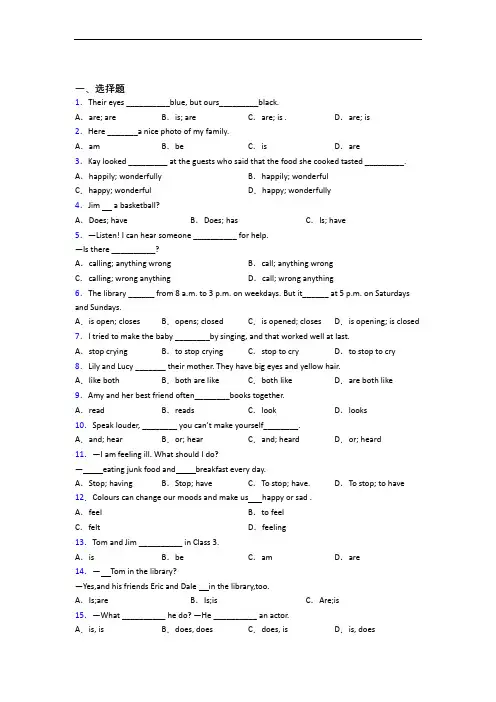
一、选择题1.Their eyes __________blue, but ours_________black.A.are; are B.is; are C.are; is . D.are; is2.Here _______a nice photo of my family.A.am B.be C.is D.are3.Kay looked _________ at the guests who said that the food she cooked tasted _________. A.happily; wonderfully B.happily; wonderfulC.happy; wonderful D.happy; wonderfully4.Jim a basketball?A.Does; have B.Does; has C.Is; have5.—Listen! I can hear someone __________ for help.—Is there __________?A.calling; anything wrong B.call; anything wrongC.calling; wrong anything D.call; wrong anything6.The library ______ from 8 a.m. to 3 p.m. on weekdays. But it______ at 5 p.m. on Saturdays and Sundays.A.is open; closes B.opens; closed C.is opened; closes D.is opening; is closed 7.I tried to make the baby ________by singing, and that worked well at last.A.stop crying B.to stop crying C.stop to cry D.to stop to cry 8.Lily and Lucy _______ their mother. They have big eyes and yellow hair.A.like both B.both are like C.both like D.are both like 9.Amy and her best friend often________books together.A.read B.reads C.look D.looks 10.Speak louder, ________ you can’t make yourself________.A.and; hear B.or; hear C.and; heard D.or; heard11.—I am feeling ill. What should I do?— eating junk food and breakfast every day.A.Stop; having B.Stop; have C.To stop; have. D.To stop; to have 12.Colours can change our moods and make us happy or sad .A.feel B.to feelC.felt D.feeling13.Tom and Jim __________ in Class 3.A.is B.be C.am D.are14.— Tom in the library?—Yes,and his friends Eric and Dale in the library,too.A.Is;are B.Is;is C.Are;is15.—What __________ he do? —He __________ an actor.A.is, is B.does, does C.does, is D.is, does16.The baby is crying. Her brother tries her best to make her ______A.to laugh B.laugh C.laughing D.laughed 17.The water ______ cool when I jumped into the pool for morning exercise.A.was felt B.is felt C.felt D.feels18.--Lucy______her mother and her mother______very young.A.looks like; looks like B.looks like; looksC.looks; looks like D.looks; looks19.As we all know, the Anti-Japanese War ________ in 1937, and ________ for eight years. A.was broken out; lasted B.broke into;lastedC.broke out; was lasted D.broke out;lasted20.I often play volleyball after class. But my cousin Lily _________.A.does B.doesn’t C.do D.don’t21.The air _______ fresh after the rain. And the sky is blue.A.feels B.tastes C.smells D.sounds22.________your brother________ a baseball?A.Do; have B.Does; has C.Does; have D.Do; has 23.—Do you have an art festival at school?—Yes, ________.A.we have B.we can C.we do24.2019 has come. I hope everyone can make his dream ________.A.came true B.come true C.comes true D.coming true 25.Karen and Helen _______ my brother's friends. I know _______.A.is; her B.are; them C.are; her D.is; them【参考答案】***试卷处理标记,请不要删除一、选择题1.A解析:A【解析】【分析】【详解】句意:他们的眼睛是蓝色的,但是我们的眼睛是黑色的。
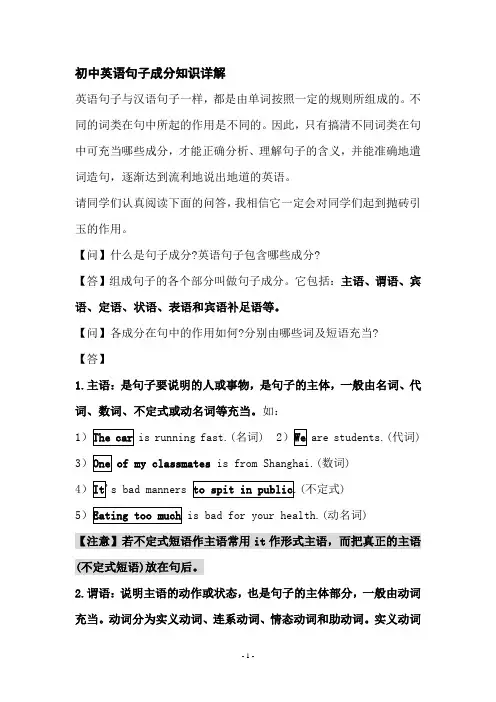
初中英语句子成分知识详解英语句子与汉语句子一样,都是由单词按照一定的规则所组成的。
不同的词类在句中所起的作用是不同的。
因此,只有搞清不同词类在句中可充当哪些成分,才能正确分析、理解句子的含义,并能准确地遣词造句,逐渐达到流利地说出地道的英语。
请同学们认真阅读下面的问答,我相信它一定会对同学们起到抛砖引玉的作用。
【问】什么是句子成分?英语句子包含哪些成分?【答】组成句子的各个部分叫做句子成分。
它包括:主语、谓语、宾语、定语、状语、表语和宾语补足语等。
【问】各成分在句中的作用如何?分别由哪些词及短语充当?【答】1.主语:是句子要说明的人或事物,是句子的主体,一般由名词、代词、数词、不定式或动名词等充当。
如:1名词) 2代词)3of my classmates is from Shanghai.(数词)4不定式)5动名词)【注意】若不定式短语作主语常用it作形式主语,而把真正的主语(不定式短语)放在句后。
2.谓语:说明主语的动作或状态,也是句子的主体部分,一般由动词充当。
动词分为实义动词、连系动词、情态动词和助动词。
实义动词单独作谓语,连系动词与表语一起构成谓语,情态动词与省略to的不定式构成合成谓语,助动词与动词原形共同构成谓语部分。
如:1)实义动词)2)系动词+表语)3)助动词+实义动词)4)情态动词+实义动词)5助动词+实义动词)【注意】谓语与主语在人称与数方面要相互照应。
3.宾语:是及物动词所涉及的对象,一般由名词、代词、不定式及动名词等充当。
如:1)名词)2)代词)3)不定式)4)动名词)【注意】①有的动词可接双宾语,间接宾语指人,直接宾语指物。
这类动词常见的有:give,buy,lend,pass, tell,leave等。
如:He bought me a book. Pass me the ball,will you?(间宾+直宾) 直接宾语一般放在间接宾语之后,但若把直接宾语放在前面,则要在间接宾语前加适当的介词如to或 for等。
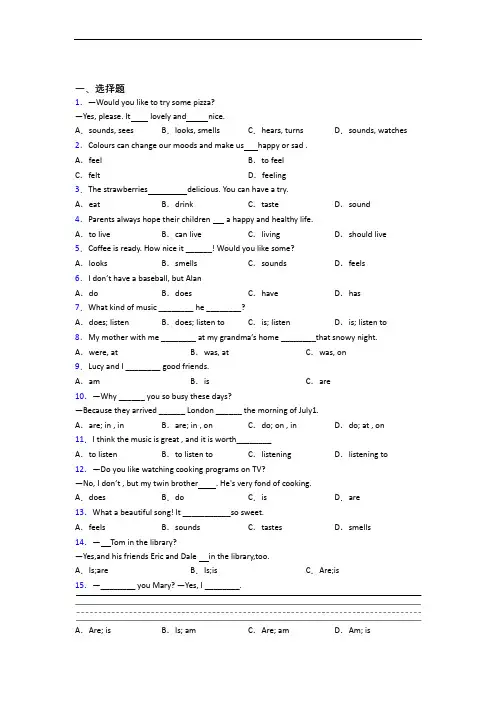
一、选择题1.—Would you like to try some pizza?—Yes, please. It lovely and nice.A.sounds, sees B.looks, smells C.hears, turns D.sounds, watches 2.Colours can change our moods and make us happy or sad .A.feel B.to feelC.felt D.feeling3.The strawberries delicious. You can have a try.A.eat B.drink C.taste D.sound 4.Parents always hope their children a happy and healthy life.A.to live B.can live C.living D.should live 5.Coffee is ready. How nice it ______! Would you like some?A.looks B.smells C.sounds D.feels6.I don’t have a baseball, but AlanA.do B.does C.have D.has7.What kind of music ________ he ________?A.does; listen B.does; listen to C.is; listen D.is; listen to 8.My mother with me ________ at my grandma’s home ________that snowy night. A.were, at B.was, at C.was, on9.Lucy and I ________ good friends.A.am B.is C.are10.—Why ______ you so busy these days?—Because they arrived ______ London ______ the morning of July1.A.are; in , in B.are; in , on C.do; on , in D.do; at , on 11.I think the music is great , and it is worth________A.to listen B.to listen to C.listening D.listening to 12.—Do you like watching cooking programs on TV?—No, I don’t , but my twin brother . He's very fond of cooking.A.does B.do C.is D.are 13.What a beautiful song! It ___________so sweet.A.feels B.sounds C.tastes D.smells 14.— Tom in the library?—Yes,and his friends Eric and Dale in the library,too.A.Is;are B.Is;is C.Are;is15.—________ you Mary? —Yes, I ________.A.Are; is B.Is; am C.Are; am D.Am; is16.—Do you know whom they will have ________the parts of car together?—Sorry,I have no idea.A.fix B.fixed C.to fix D.fixing17.I don't have a Ping-Pong ball, _______ my brother _______.A.but; do B.and; does C.and;do D.but; does18.Li Ming's father __________want __________the new coat.A.doesn't; buy B.don't; to buy C.don't; buy D.doesn't; to buy 19.Our teachers always make us ________ a lot of homework.A.to do B.do C.does D.doing20.— How ________ your trip to Australia?—Great. I’ll go there again next year.A.was B.is C.are D.were21.— How sweet the flowers _____ in spring!— Yes, many tourists come to enjoy them every day.A.taste B.smell C.feel22.The air _______ fresh after the rain. And the sky is blue.A.feels B.tastes C.smells D.sounds23.I like this dress very much. It soft and smooth.A.feels B.touches C.is felt D.is touched 24.2019 has come. I hope everyone can make his dream ________.A.came true B.come true C.comes true D.coming true 25.—William, your hat _______ nice.—Thanks.A.buys B.looks C.finds【参考答案】***试卷处理标记,请不要删除一、选择题1.B解析:B【解析】【分析】【详解】句意:——你想尝尝披萨吗?——好的,请。
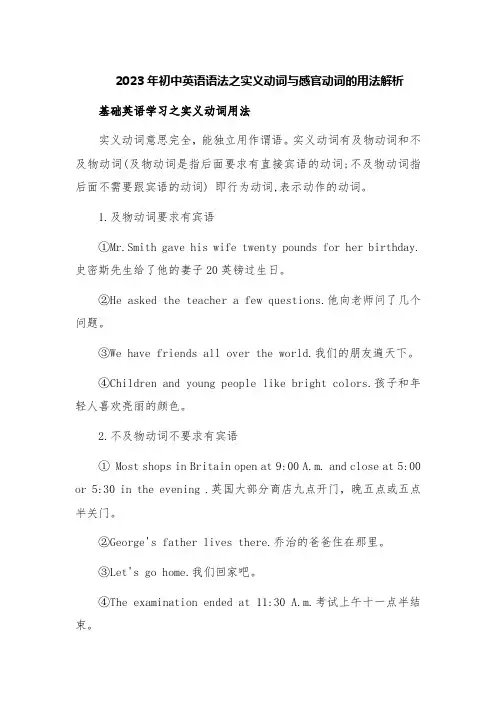
2023年初中英语语法之实义动词与感官动词的用法解析基础英语学习之实义动词用法实义动词意思完全,能独立用作谓语。
实义动词有及物动词和不及物动词(及物动词是指后面要求有直接宾语的动词;不及物动词指后面不需要跟宾语的动词) 即行为动词,表示动作的动词。
1.及物动词要求有宾语①Mr.Smith gave his wife twenty pounds for her birthday.史密斯先生给了他的妻子20英镑过生日。
②He asked the teacher a few questions.他向老师问了几个问题。
③We have friends all over the world.我们的朋友遍天下。
④Children and young people like bright colors.孩子和年轻人喜欢亮丽的颜色。
2.不及物动词不要求有宾语① Most shops in Britain open at 9:00 A.m. and close at 5:00 or 5:30 in the evening .英国大部分商店九点开门,晚五点或五点半关门。
②George's father lives there.乔治的爸爸住在那里。
③Let's go home.我们回家吧。
④The examination ended at 11:30 A.m.考试上午十一点半结束。
3.特殊实义动词英语动词很多既是及物动词又是不及物动词,如close, begin, study, leave, work等。
①The post office closes at 9:00 p. m.邮局晚上9点关门。
②Close the window,please.请关窗。
③Shall we begin now?我们现在开始吗?④ Bill began working as a sailor after he left school.比尔毕业后当水手。
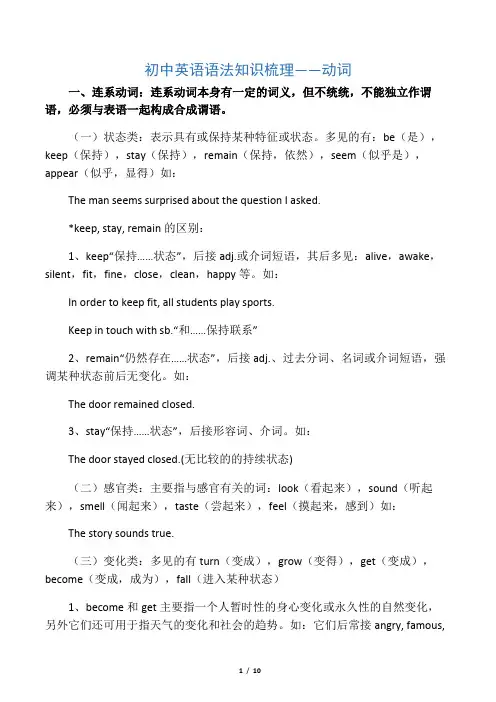
初中英语语法知识梳理——动词一、连系动词:连系动词本身有一定的词义,但不统统,不能独立作谓语,必须与表语一起构成合成谓语。
(一)状态类:表示具有或保持某种特征或状态。
多见的有:be(是),keep(保持),stay(保持),remain(保持,依然),seem(似乎是),appear(似乎,显得)如:The man seems surprised about the question I asked.*keep, stay, remain的区别:1、keep“保持……状态”,后接adj.或介词短语,其后多见:alive,awake,silent,fit,fine,close,clean,happy等。
如:In order to keep fit, all students play sports.Keep in touch with sb.“和……保持联系”2、remain“仍然存在……状态”,后接adj.、过去分词、名词或介词短语,强调某种状态前后无变化。
如:The door remained closed.3、stay“保持……状态”,后接形容词、介词。
如:The door stayed closed.(无比较的的持续状态)(二)感官类:主要指与感官有关的词:look(看起来),sound(听起来),smell(闻起来),taste(尝起来),feel(摸起来,感到)如:The story sounds true.(三)变化类:多见的有turn(变成),grow(变得),get(变成),become(变成,成为),fall(进入某种状态)1、become和get主要指一个人暂时性的身心变化或永久性的自然变化,另外它们还可用于指天气的变化和社会的趋势。
如:它们后常接angry, famous,ill, old, well, deaf, strong等。
如:get dressed穿衣服2、grow“渐渐变得……起来,长得”,主要表示逐渐变化,强调变化的过程。
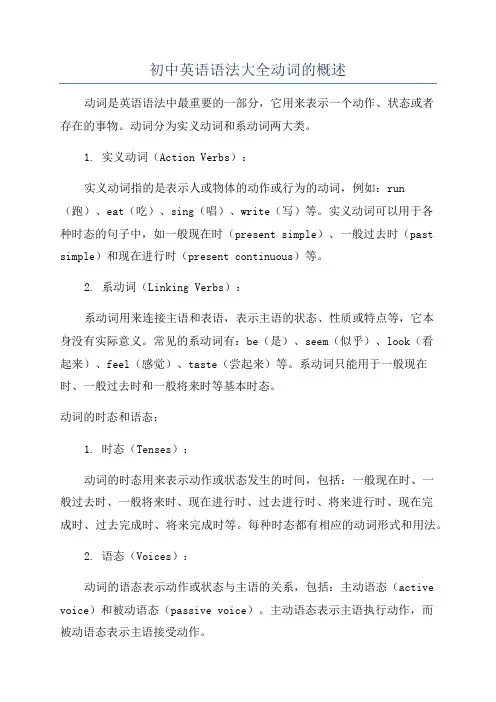
初中英语语法大全动词的概述动词是英语语法中最重要的一部分,它用来表示一个动作、状态或者存在的事物。
动词分为实义动词和系动词两大类。
1. 实义动词(Action Verbs):实义动词指的是表示人或物体的动作或行为的动词,例如:run (跑)、eat(吃)、sing(唱)、write(写)等。
实义动词可以用于各种时态的句子中,如一般现在时(present simple)、一般过去时(past simple)和现在进行时(present continuous)等。
2. 系动词(Linking Verbs):系动词用来连接主语和表语,表示主语的状态、性质或特点等,它本身没有实际意义。
常见的系动词有:be(是)、seem(似乎)、look(看起来)、feel(感觉)、taste(尝起来)等。
系动词只能用于一般现在时、一般过去时和一般将来时等基本时态。
动词的时态和语态:1. 时态(Tenses):动词的时态用来表示动作或状态发生的时间,包括:一般现在时、一般过去时、一般将来时、现在进行时、过去进行时、将来进行时、现在完成时、过去完成时、将来完成时等。
每种时态都有相应的动词形式和用法。
2. 语态(Voices):动词的语态表示动作或状态与主语的关系,包括:主动语态(active voice)和被动语态(passive voice)。
主动语态表示主语执行动作,而被动语态表示主语接受动作。
动词的形式变化:1.时态、人称和数的变化:动词的形式会根据时态、人称和数的不同而发生变化。
一般而言,动词在第三人称单数形式(he/she/it)中,要在词尾加上-s或-es,如:eat(吃)→ eats(吃),go(去)→ goes(去)。
2.动词的过去式和过去分词形式:大部分动词的过去式是在词尾加-ed,如:work(工作)→ worked (工作过)。
而过去分词的形式分为规则动词和不规则动词。
规则动词在词尾加-ed,如:played(玩过),而不规则动词则没有规则可循,如:gone(去过)。
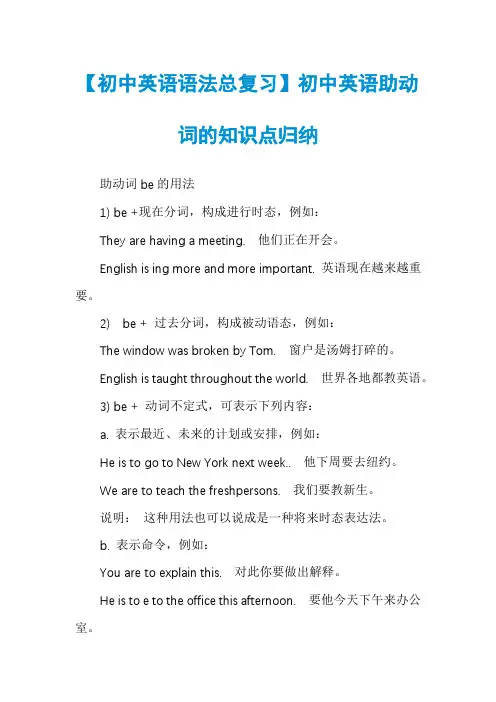
【初中英语语法总复习】初中英语助动词的知识点归纳助动词be的用法1) be +现在分词,构成进行时态,例如:They are having a meeting.他们正在开会。
English is ing more and more important. 英语现在越来越重要。
2)be + 过去分词,构成被动语态,例如:The window was broken by Tom.窗户是汤姆打碎的。
English is taught throughout the world.世界各地都教英语。
3) be + 动词不定式,可表示下列内容:a. 表示最近、未来的计划或安排,例如:He is to go to New York next week..他下周要去纽约。
We are to teach the freshpersons.我们要教新生。
说明:这种用法也可以说成是一种将来时态表达法。
b. 表示命令,例如:You are to explain this.对此你要做出解释。
He is to e to the office this afternoon.要他今天下午来办公室。
c.征求意见,例如:How am I to answer him?我该怎样答复他?Who is to go there?谁该去那儿呢?d. 表示相约、商定,例如:We are to meet at the school gate at seven tomorrow morning.我们明天早晨7点在校门口集合。
助动词have的用法1)have +过去分词,构成完成时态,例如:He has left for London.他已去了伦敦。
By the end of last month, they had finished half of their work.上月未为止,他们已经完成工作的一半。
2)have + been +现在分词,构成完成进行时,例如:I have been studying English for ten years.我一直在学英语,已达十年之久。
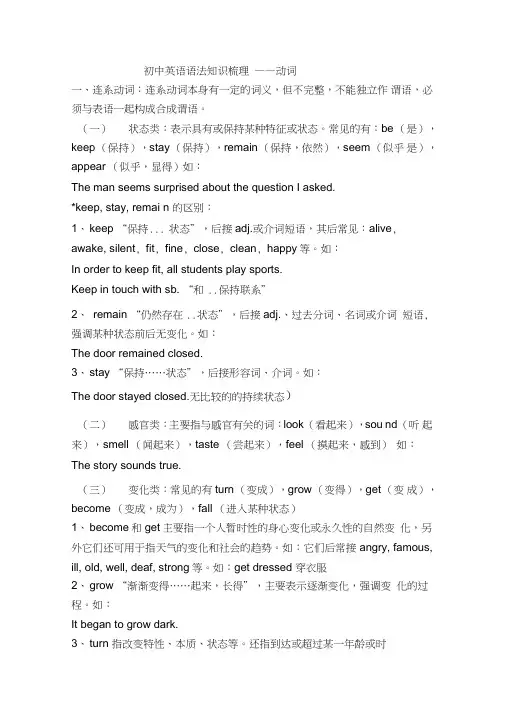
初中英语语法知识梳理——动词一、连系动词:连系动词本身有一定的词义,但不完整,不能独立作谓语,必须与表语一起构成合成谓语。
(一)状态类:表示具有或保持某种特征或状态。
常见的有:be (是),keep (保持),stay (保持),remain (保持,依然),seem (似乎是),appear (似乎,显得)如:The man seems surprised about the question I asked.*keep, stay, remai n 的区别:1、keep “保持... 状态”,后接adj.或介词短语,其后常见:alive, awake, silent, fit, fine, close, clean, happy等。
如:In order to keep fit, all students play sports.Keep in touch with sb. “和.. 保持联系”2、remain “仍然存在.. 状态”,后接adj.、过去分词、名词或介词短语,强调某种状态前后无变化。
如:The door remained closed.3、stay “保持……状态”,后接形容词、介词。
如:The door stayed closed.无比较的的持续状态)(二)感官类:主要指与感官有关的词:look (看起来),sou nd (听起来),smell (闻起来),taste (尝起来),feel (摸起来,感到)如:The story sounds true.(三)变化类:常见的有turn (变成),grow (变得),get (变成),become (变成,成为),fall (进入某种状态)1、become和get主要指一个人暂时性的身心变化或永久性的自然变化,另外它们还可用于指天气的变化和社会的趋势。
如:它们后常接angry, famous, ill, old, well, deaf, strong等。

(完整版)初中英语语法知识点归纳本文将为大家归纳总结初中英语语法知识点,旨在帮助初中生更好地掌握英语语法。
时态一般现在时1. 动词原形表示现在的事实或惯。
2. 表示普遍真理、经常性行为或个人常规。
现在进行时1. 表示现在正在进行的动作。
2. 动词+ing形式。
一般过去时1. 表示过去发生的事情。
2. 动词过去式。
过去进行时1. 表示过去某个时间正在进行的动作。
2. was/were + 动词+ing形式。
一般将来时1. 表示将来的动作或状态。
2. will/shall + 动词原形。
语态主动语态1. 表示主语是动作的执行者。
2. 主语 + 动词原形。
被动语态1. 表示主语是动作的承受者。
2. be + 过去分词。
比较级与最高级比较级1. 用于比较两个人或物。
2. 形容词 + er。
最高级1. 用于比较三个或更多人或物。
2. 形容词 + est。
祈使句祈使句1. 表示请求、命令、建议或劝告。
2. 动词原形。
倒装句倒装句1. 将助动词或情态动词提前至主语之前。
2. 系动词be的倒装句:is/am/are/was/were + 主语。
直接引语与间接引语直接引语1. 直接引用他人的话。
2. 用引号将原话括起来。
间接引语1. 用自己的话转述他人的话。
2. 没有引号。
以上是初中英语语法的主要知识点归纳。
希望这份文档能够帮助到您更好地学习和掌握英语语法知识。
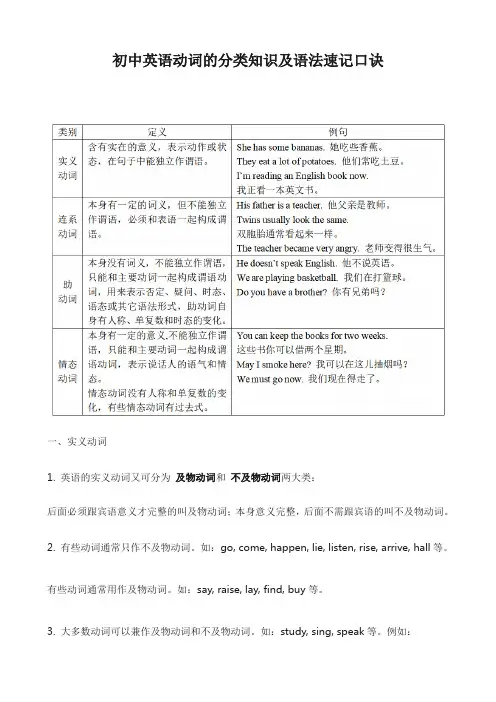
初中英语动词的分类知识及语法速记口诀一、实义动词1. 英语的实义动词又可分为及物动词和不及物动词两大类:后面必须跟宾语意义才完整的叫及物动词;本身意义完整,后面不需跟宾语的叫不及物动词。
2. 有些动词通常只作不及物动词。
如:go, come, happen, lie, listen, rise, arrive, hall等。
有些动词通常用作及物动词。
如:say, raise, lay, find, buy等。
3. 大多数动词可以兼作及物动词和不及物动词。
如:study, sing, speak等。
例如:Who is going to speak at the meeting?谁打算在会上发言?(speak作不及物动词)Few people outside China speak Chinese.在中国以外很少人讲汉语。
(speak作及物动词)4. 有些动词作及物动词与作不及物动词时的意义有所不同。
如:know, wash等。
例如:It’s your turn to wash dishes.轮到你洗碗了。
I had to wash and dress in a hurry.我得赶紧洗漱穿衣。
5. 有些动词常和介词、副词或其它词类一起构成固定词组,形成短语动词。
如:listen, reply, wait, look等。
二、连系动词连系动词用来连接主语和表语,连系动词后面常为形容词。
1. 表示“是”的动词be。
这个词在不同的主语后面和不同的时态中有不同的形式,is,am,are,was,were,have / has been等要特别予以注意。
例如:He is a teacher.他是个教师。
We are Chinese.我们是中国人。
2. 表示“感觉”的词,如look(看起来),feel(觉得,摸起来),smell(闻起来),sound(听起来),taste(尝起来)等。
例如:She looked tired.她看一去很疲劳。
初中英语语法归纳动词概说(思维导图+知识梳理+好题精炼)思维导图知识梳理一、实义动词、连系动词、助动词和情态动词动词是表示动作、状态或性质等的词,根据其词义及在句中的作用可分为实义动词(亦称行为动词)、连系动词、助动词和情态动词四大类.(一)实义动词实义动词又称为行为动词,表示动作或状态,有完整的词义,在句中能独立作谓语.实义动词又可分为及物动词(vt.)和不及物动词(vi.).1.及物动词,它后面必须跟宾语才有完整的意义I like none of the books.这些书我全不喜欢.I know little about the subject.我对这个问题知道得很少.She killed the locust with a newspaper.她用张报纸把蝗虫打死了.I gave him some books.我给了他几本书.He often reads an English book.他经常看英文书.注意及物动词可用于被动语态.2.不及物动词本身意思完整,其后无须跟宾语My father often comes back late.我父亲经常晚回来.The sun shone brightly this morning.今天早晨阳光灿烂.不及物动词不能直接接名词,如果要接名词,要在动词和名词之间加介词或副词.I looked for my watch every place but I didn't find it.我到处找我的表,但是没找到.I'll wait for you until eight o'clock.我将等你到八点钟.有一些动词既可作及物动词,又可作不及物动词.如何区别它们,就看它们后面是否直接接名词作宾语.She sings very well.她歌唱得很好.(用作不及物动词)She sings English songs very well.她唱英语歌唱得很好.(用作及物动词)(二)连系动词它本身有一定词义,但不能单独作谓语,必须与表语一起构成系表结构.连系动词可以分为三类:1.单纯表示一个特征或状态用得最多的是be(是、在),另外还有feel(觉得、摸上去),look(看起来),sound(听起来),taste(尝起来),seem(似乎是),appear(显得、看来好像)等.The flowers look beautiful.这些花看上去很漂亮.She is a very good student.她是个非常好的学生.The cake smells strange.这蛋糕有怪味.Her voice sounds sweet.她的嗓音很甜美.I'm not feeling well. I often feel tired.我感觉不舒服.我常常感到疲劳.The medicine tastes terrible.这种药太难吃了.2.表示变成某种状态这样的动词有become(变成),come(成为),fall(变得),get(变得),grow(渐渐变得),run(变成),turn(变为),go(变成),prove(证明),make(变为).His grandma is growing very old.他的祖母年纪很大了.It's getting darker and darker.天越来越黑了.He became a doctor three years ago.他3年前当上了医生.His face turned pale. He must be ill.他的脸变得苍白,他一定是病了.He fell asleep.他睡着了.The meat has gone bad.肉变坏了.The river ran dry(=stopped flowing)during the drought.这条河在干旱期间断流了.3.表示保持某种状态这样的动词有continue(仍旧是),keep(保持),lie(处于······状态),remain(仍是),,stand(处于···状态),stay(继续处于······状态)等.Keep quiet, please.请安静.You must look after yourself and keep healthy.你要照顾好自己,保持身体健康.The weather continued fine for several days.一连好几天天气都很好.Shops remained open till late in the evening.商店开到晚上很晚的时候.The window stayed open all the night.窗子整夜开着.The house stood empty for a long time.那所房子空了好长一段时间.4.表示感觉或知觉的连系动词常用来表示人的感觉或知觉的连系动词有feel, taste, smell, sound和look,分别相当于汉语中的“摸起来,感觉”“尝起来”“闻起来”“听起来”“看上去”的概念.后面通常接形容词作表语,也可接介词短语like.The music sounds beautiful.这段音乐听起来很优美.The rock looked like a tiger.这块岩石看上去像只老虎.(三)助动词本身没有词义,不能独立作谓语,必须和主要动词一起构成谓语,表示否定、疑问、时态、语态等语法形式.常见的助动词有:be, do, have, shall, will等.She is doing her homework now.她现在正在做家庭作业.What have you been doing these days?你这些天一直在做什么?I'll be meeting them at the station.我将去车站接他们.Does anyone ever take them to school?有人送他们去上学吗?Did anyone sharpen this knife?有人把刀磨利了吗?(四)情态动词表示说话人对某一动作或状态的态度,或表示主观设想.情态动词有实际的词义,但词义不完全,不可单独作谓语,须同动词原形连用,不随人称和数而变化.情态动词所表示的情态有:命令、允诺、请求、愿望、愿意、义务、必要、可能、能力、需要等.初中阶段应掌握的情态动词有:can/could, may/might, must, shall/should, will/would, need.如:Ask Miss Gao. She may tell you why,去问高老师.她可能会告诉你原因.Need we hand in our exercise-books before class?我们需要在上课前交练习本吗?You shouldn't do that.你不该做那件事.二、单词动词和短语动词动词根据其构成方式还可分单词动词和短语动词(一)单词动词就是由一个单词构成的动词,如:live, work, study, learn, come, go, hit, strike等.(二)短语动词主动词还可由两个或两个以上的单词构成,这就是“短语动词”.短语动词大多由动词与介词/副词等搭配而成.在使用中,我们要将短语动词当作一个整体来使用.短语动词主要有以下几种类型.1.动词+介词go over复习,listen to 听,think about 考虑,look for寻找,rely on依靠,depend on 依靠,look into 调查,play with和······一起玩,send for派人去请,consist of由·····组成,arrive at 到达等.这类短语动词相当于及物动词,须跟宾语.Stop talking and listen to me carefully.停止说话,认真听我讲课.Who is waiting for you?谁在等你?2.动词+副词eat up 吃光,give up 放弃,hold up 举起,put on穿;上演,take place 发生,turn on打开,try on试穿,等它们构成新的词义,有的用作及物动词,有的用作不及物动词.Please wake me up at 5:00 tomorrow morning.请在明天早晨5点钟唤醒我.Let me try it on.让我试穿一下.Please turn on the radio=Please turn the radio on.请打开收音机.点拨(1)如果动词+副词结构的宾语是代词,就必须把宾语插在动词和副词之间.Let him in.让他进去.He turned it on.他把它打开.(2)如果宾语是名词,该名词既可放在动词和副词之间,也可放在副词之后.They put the meeting off till next week.他们把会议推迟到下周召开.He turned off the light before he left the room.他离开房间前关上了灯.3.动词+副词+介词catch up with 赶上,get on with 与某人相处,go on with 继续,keep up with 跟上,do away with 废除,look down upon 轻视,look forward to 期待,keep away from脱离,等.这类短语动词相当于及物动词,后面须跟宾语.How are they getting along with their work?他们工作进展如何?Li Ping works hard all the time to catch up with the others.李平一直努力学习,目的是想赶上其他同学.If we don't finish painting the room today, we can go on with it tomorrow.要是今天房间粉刷不完,我们明天接着干.4.动词+名词+介词catch hold of(on)抓住,握住,give lessons to给······上课,make friends with 与······交朋友,take care of照料,pay attention to 注意,等.这类动词短语相当于及物动词,后面须跟宾语.We made friends with them during the trip.我们在旅途中和他们结为朋友.Take care of yourself.保重!5.动词+形容词+介词be fond of爱好,be familiar with 熟悉,be suitable for适合,be late for迟到,be good at 善于,be afraid of害怕,等.这类短语动词相当于及物动词,后面须跟宾语.My parents are strict with me.我父母对我要求严格.My brother is good at swimming.我弟弟擅长游泳.I'm looking forward to seeing you.我高兴地期望和你见面.Are you afraid of snakes?你怕蛇吗?I'm very fond of dancing.我很喜欢跳舞.Many people are fond of showing off.有许多人喜欢炫耀.三、延续性动词和非延续性动词英语中表示动作的动词,按其动作发生过程的长短,可分为延续性动词和非延续性动词.(一)延续性动词又叫持续性动词,它所表示的动作是一种延续的动作,这种动作可以延续下去或产生持久的影响.延续性动词可以与表示一段时间的状语连用,如“for+一段时间”“since+从句(一般过去时)”“since+时间点”,how long等.这样的动词有learn, work, stand, lie, walk, keep, have, wait, smoke, watch, sing, read, sleep, live等.We have known each other since childhood.自孩提时代我们就认识.I have been living here for years.我在这里住了多年了.They've been working from morning to night.他们从早到晚一直在干活儿.点拨延续性动词通常(如一般过去时)不可以和一个表示短暂的具体时间状语连用;若用于进行时态,则可以和表示具体时刻的时间状语连用.正:The boy was reading at six yesterday afternoon.正:The boy began to read at six yesterday afternoon.误:The boy read at six yesterday afternoon.(二)非延续性动词这种动词表示的动作不能延续,即动作发生后立即结束,产生某种结果.这样的动词有close, die, arrive, post, come, fall, leave, go, break, lose, give, join, receive,buy, borrow, become, start, happen, begin, finish, kill, marry等.The boy broke his arm yesterday.这男孩昨天把胳膊弄折了.He went to Shanghai two weeks ago.两个星期前,他去上海了.It happened after three years.事情发生于三年后.如上所述,非延续性动词的肯定式不能与for, since引导的表示一段时间的短语或从句连用.点拨(1)用“(一段时间)+ago”代替“for+-段时间”或用“It is+(一段时间)+sin ce”或用“(一段时间)+has passed+ since”.(2)将非延续性动词(词组)改成be+形容词(副词、名词、介词短语等)或相近的延续性动词.四、限定性动词和非限定性动词英语动词还可以根据其与主语的关系分为限定动词和非限定动词.限定动词在句子中起谓语作用,可与助动词或情态动词连用,但必须与主语在人称和数上保持一致.(一)限定性动词The coat is much too big for me.这衣服我穿太大了.They haven't arrived at an agreement.他们尚未达成协议.He goes to school every day.他每天上学.They were preparing for the party last week.上周他们正为聚会做准备.(二)非限定性动词英语主动词有三种非限定形式,它们是不定式(包括带to的和不带to的不定式),-ing分词和-ed分词,它们在句中不起谓语作用,而可以起主语、宾语、补语、状语、定语等作用.它们不受主语的人称和数的制约.I want Bill to come with me.我想要比尔跟我一道去.I heard him lock the door.我听到他锁门了.I must get my bike repaired.我必须叫人修一下我的自行车.Doing this can save a lot of time and money.这样做可以节省很多时间和钱.I can't help laughing.我忍不住笑了.好题精练一、选择填空1.No one knew why Miss Black_________ the new boxes.A. has brokenB. had brokenC. would have brokenD. have broken2.-Where are you_________?-At the Grand Hotel.A. stayingB. livingC. remainingD. stopping3.Don't keep on_________ the book.A. findingB. seeingC. borrowingD. reading4.What a fine day, _________.A. what are theyB. won't itC. isn't itD. No, it isn't5.The stranger told us his name after we_________ him twice.A. askedB. have askedC. were askingD. had asked6.Today is Saturday. Tomorrow_________ Sunday.A. is going toB. willC. will beD. is going to be7.Don't worry, the train_________ yet.A. arrivedB. won't arriveC. has arrivedD. hasn't arrived8.Tim_________ the army for three years.A. has joinedB. has taken part inC. has attentedD. has been in9.I believe she'll always keep what you_________ her.A. have just givenB. just gaveC. won't giveD. had given10.One morning while I_________ along the street, I_________ an old man crying.A. walking; heardB. walked; heardC. was walking; was hearingD. was walking; heard答案:1-5BADCD 6-10CDDAD二、改正下列句中的错误1.The old man is dieing._________________________________________________________________________ ___2.They entered into the hall one after another._________________________________________________________________________ ___3.Before liberation the Yellow River often overflew its banks._________________________________________________________________________ ___4.She married with a rich man at the age of twenty._________________________________________________________________________ ___5.The cake tasted well._________________________________________________________________________ ___6.What did they discuss about at the meeting?_________________________________________________________________________ ___7.The sun raises in the east._________________________________________________________________________ ___8.We ought study hard for the people._________________________________________________________________________ ___9.I have put up the map on the wall an hour ago._________________________________________________________________________ ___10.Do you agree me on this point?_________________________________________________________________________ ___答案:1.dieing→dying2.去掉into3.overflew→overflowed4.去掉with5.well→good6.去掉about7.raises→rises8.ought→ought to9.have put up→ put up10.agree后加with。
初中英语语法专题—动词讲解动词是英语语法中的重要部分,它用于表示动作、状态或存在。
掌握动词的用法对于正确使用英语至关重要。
以下是初中英语中常见动词的讲解。
一. 动词的分类动词可以分为以下几类:1. 行为动词:表示人或物体的动作,如"run"(跑)、"eat"(吃)等。
行为动词:表示人或物体的动作,如"run"(跑)、"eat"(吃)等。
例句:He runs every morning.(他每天早上跑步)2. 状态动词:表示人或物体的状态,如"be"(是)、"seem"(似乎)等。
状态动词:表示人或物体的状态,如"be"(是)、"seem"(似乎)等。
例句:She is happy today.(她今天很开心)3. 助动词:用于构成各种时态、语态和情态动词,如"be"、"do"、"have"等。
助动词:用于构成各种时态、语态和情态动词,如"be"、"do"、"have"等。
例句:I have been to London.(我去过伦敦)4. 情态动词:用于表示说话者的意图、愿望、能力、许可等,如"can"(能)、"may"(可能)等。
情态动词:用于表示说话者的意图、愿望、能力、许可等,如"can"(能)、"may"(可能)等。
例句:You can go home now.(你现在可以回家了)二. 动词的时态动词的时态用于表示动作或状态发生的时间。
常见的时态有以下几种:1. 一般现在时:表示经常性或惯性的动作或状态。
一般现在时:表示经常性或习惯性的动作或状态。
动词的各种形式和分类一、考点解读动词的语法现象较为复杂,难度较大,是中考中重点考查的知识之一,了解动词的各种形式以及动词的分类,特别是注意动词的语法意义,不同的词形和固定搭配用法是非常重要的,可以说英语是由许许多多的搭配用法而组成的。
今天我们这个专题中将复习动词的各种形式和分类,我们主要复习归纳以下的内容:1.动词的各种形式;2.动词的种类(1)实义动词(2)连系动词(3)情态动词和助动词3.动词短语二、专题梳理(一)动词的各种形式英语动词有五种基本形式,即动词原形、一般现在时第三人称单数、过去式、过去分词和现在分词。
规则动词的五种形式如下表所示(以动词walk,like,stop,play为例):1.一般现在时第三人称单数的构成动词的一般现在时第三人称单数的构成如下表所示:以音素结尾或以字母o结尾的动词,加-espassgopasses,pushes,watches,does,goes2.规则动词过去式、过去分词的构成规则动词过去式、过去分词的构成如下表所示:特别提示:travel的过去式和过去分词英国写法为travelled,travelled,而美国写法为traveled,traveled。
在英语中这样的动词还有quarrel等。
发音规则:动词第三人称单数的发音规律与名词的复数形式发音规律是一致的。
动词的过去式和过去分词发音规律为:(1)在清辅音后发[t],如:(2)在元音或浊辅音后读[d],如:(3)辅音[t]、[d]后读,如:3.现在分词的构成现在分词的构成如下表所示:必须双写词尾字母再加-ing形成的单词有:begin 开始cut 切割dig 挖drop 掉forget 忘记 get 使、得到hit 击中let 让prefer 更喜欢 put 放run 跑sit 坐shop 买东西 stop 停止 swim 游泳refer 参考以辅音字母+y结尾的动词,去掉y加-ies变为第三人称单数形式,加-ied变为过去式和过去分词的常用动词有:carry 携带copy 抄cry 哭fry 油煎hurry 快走 spy 侦探study 学习try 试 tidy 整理worry 担忧(二)动词的种类根据不同的分类方式,动词可分为不同的类型。
一、选择题1.You should________ the teacher________being late for school.A.apology to, about B.apologize to, for C.apologies to, for D.apologize to, on2.—Must I finish the work today, Mum?—No, you ________.You can finish it tomorrow.A.mustn't B.can't C.shouldn't D.needn't 3.—Is that Kate’s green bike?—It ____________be hers. She likes pink.A.can’t B.could C.mustn’t D.might 4.All passengers_____ go through safety check before they take a plane.A.may B.can C.must D.need 5.—Is that cap Bob’s?—No, it ________ be his. His is blue.A.can’t B.mustn’t C.needn’t D.may not 6.A: Is Jim coming by train?B: I’m not sure. He _______ drive his car.A.must B.may C.need D.should 7.—Hi, Lucy, may I sit here?—No, ________. The seats are for teachers and parents.A.you needn't B.you aren't C.you mustn't D.you don't 8.—Can I take some milk and biscuits to the reading room?—No, our school has a rule that students _______ eat or drink there.A.can’t B.mustn’t C.needn’t D.may not 9.— Mom, I got a big box from express(快递). What is it?—I’m not sure. It ________be a present from your grandmother.A.should B.might C.must D.will 10.— I wonder if these are Jim's glasses.—They _____his. He doesn't wear glasses.A.might be B.could be C.can't be 11.The milk tastes bad. You’d better_______.A.throw it away B.to throw it awayC.throw them away D.to throw them away12.I’m sorry, children over 1.4 meters________pay the full price for the show. A.may B.must C.can D.ought to 13.I see the blackboard. I need to have my glasses.A.can B.c an’t C.must D.mustn’t 14.One ______ easily lose his way when he visits or comes to a new place.A.may B.must C.need D.should 15.—Must I start now?—No, you_______________.A.mustn't B.can't C.needn't D.must16.This book _____ Lucy’s. Look! Her name is on the book cover.A.must be B.may be C.can’t be D.mustn’t be 17.---I heard they went skating in the mountains last winter.---It ______ true because there was little snow there.A.may not be B.won’t be C.couldn’t be D.will be 18.(2017 • 湖北省宜昌市中考)—Life is becoming convenient with the Internet.—That’s true! Almost everything be done online.A.must B.would C.should D.can 19.—Could you help me download some Taylor Swift’s songs from Ku Gou?—Sorry, people download music from the Internet without pay ing, because it’s against the law. A.wouldn’t B.needn’tC.mustn’t D.couldn’t20.—We've prepared all kinds of foods for the picnic.—Do you mean I___ bring anything?A.can't B.needn't C.mustn't D.won't 21.—Who is the lady over there? Is it Miss Wang?—It __________be her. Miss Wang is much taller.A.needn't B.mustn't C.shouldn't D.can't22.You __ drive your car so fast. It's very dangerous.A.wouldn't B.shouldn't C.couldn't D.mightn't【参考答案】***试卷处理标记,请不要删除一、选择题1.B解析:B【解析】【详解】句意:你应该因为上学迟到向老师道歉。
一、选择题1.What a beautiful song! It ___________so sweet.A.feels B.sounds C.tastes D.smells 2.—Do you like watching cooking programs on TV?—No, I don’t , but my twin brother . He's very fond of cooking.A.does B.do C.is D.are3.—________ Mary________ fruit? —Of course.A.Is; like B.Does; likes C.Does; like D.Do; likes 4.These chicken wings taste ________. I want more.A.well B.wonderfully C.nice D.bad5.The strawberries delicious. You can have a try.A.eat B.drink C.taste D.sound 6.Parents always hope their children a happy and healthy life.A.to live B.can live C.living D.should live 7.The woman made her husband_______ outside the gate yesterday afternoon.A.wait B.waiting C.to wait D.waited8.A group of little ducks __________ their mother into the river and swim away. A.follow B.miss C.help D.cross9.I think the music is great , and it is worth________A.to listen B.to listen to C.listening D.listening to 10.—William, your hat _______ nice.—Thanks.A.buys B.looks C.finds11.Which of the following sentences is right?A.My books on the desk B.Nice meet you, tooC.These are my dictionaries D.Thanks you for your help.12.In the past he often made his sister____, but now he is often made ___by his sister. A.to cry; to cry B.cry; cryC.to cry; cry D.cry; to cry13.—The books on the table_________ Mike’s, right?—Yes, they are.A.am B.is C.are14.— Tom in the library?—Yes,and his friends Eric and Dale in the library,too.A.Is;are B.Is;is C.Are;is15.—Would you like to try some pizza?—Yes, please. It lovely and nice.A.sounds, sees B.looks, smells C.hears, turns D.sounds, watches16.— What kind of home do you ? — A flat three bedrooms.A.live in; with B.live; with C.live in; has D.live; has 17.Alice, it's time for school. Let me _______, or I will be late for class.A.go B.come C.to go D.to come 18.Tom and Jim __________ in Class 3.A.is B.be C.am D.are19.The Great Wall (长城) ________ long and it ________ a long history (历史).A.has; is B.is; is C.is; has D.have; has 20.Their eyes __________blue, but ours_________black.A.are; are B.is; are C.are; is . D.are; is21.Li Ming's father __________want __________the new coat.A.doesn't; buy B.don't; to buy C.don't; buy D.doesn't; to buy 22.I often play volleyball after class. But my cousin Lily _________.A.does B.doesn’t C.do D.don’t23.Mike and Jeff________ TV on weekdays.A.doesn't watch B.don't watch C.watches D.not watch24.________your brother________ a baseball?A.Do; have B.Does; has C.Does; have D.Do; has25.Amy and her best friend often________books together.A.read B.reads C.look D.looks【参考答案】***试卷处理标记,请不要删除一、选择题1.B解析:B【解析】句意:多么美妙的歌曲啊!它听起来是如此甜美。
feels感觉,摸起来;sounds听起来;tastes尝起来;smells闻起来。
四个单词都可以作系动词,后面跟形容词作表语。
根据句意可知,这里说的是歌曲,所以应是听起来,选B。
2.A解析:A【解析】【详解】句意:——你喜欢看电视上的烹饪节目吗?——不,我不喜欢,但是我的双胞胎哥哥/弟弟喜欢。
他非常喜欢烹饪。
此处用助动词代替动词,用来表示刚提到的动作,以避免重复,排除C和D;主语是mytwin brother,第三人称单数,助动词用第三人称单数形式does。
故选A。
3.C解析:C【解析】【详解】句意:——玛丽喜欢水果吗?——当然。
考查助动词和一般现在时的动词三单。
分析句子可知,此句谓语动词是行为动词like,主语是Mary,所以一般疑问句需借助动词does帮忙,用于句首需大写首字母,其后动词使用动词原形。
故选C。
4.C解析:C【解析】【详解】句意:这些鸡翅尝起来不错。
我想要更多。
考查感官动词的用法及形容词辨析。
well好,副词;wonderfully精彩地;nice好的;bad 坏的。
taste是感官系动词,其后接形容词作表语,排除AB;根据题干中“I want more.”可知鸡翅尝起来很好,排除D。
故选C。
5.C解析:C【解析】【详解】句意:草莓味道鲜美。
你可以尝一尝。
选项 A 的意思是吃,B 是喝,C 是尝起来,D 是听起来。
题目中的主语是 strawberries(草莓),delicious(美味的)是形容词,只有选项 C 和D 这两个感官动词后可以跟形容词,再加上句意的理解:草莓尝起来是美味的。
所以答案选 C。
6.B解析:B【解析】【详解】句意:父母总是希望他们的孩子能过得健康快乐。
考查宾语从句。
hope后要么直接接动词不定式作宾语,要么接宾语从句。
此处是省略引导词that的宾语从句,此处缺从句的谓语,所以用情态动词+动词原形作谓语,又此处不构成虚拟语气,所以排除D,故选B。
7.A解析:A【解析】【详解】句意:昨天下午那个女人让她的丈夫在门外等待。
考查非谓语动词。
wait动词原形;waiting动名词或现在分词形式;to wait动词不定式;waited过去分词。
make是使役动词,后接不带to的不定式作宾语补足语,make sb. do sth.让某人做某事,故选A。
8.A解析:A【解析】【详解】句意:一群小鸭子跟着它们的妈妈走到河里并游走了。
考查动词辨析。
follow跟随;miss想念,错过;help帮助;cross穿过。
一群小鸭子跟着它们的妈妈,follow表示跟随,故选A。
9.D解析:D【解析】【详解】句意:我认为这个音乐很好,很值得听。
考查非谓语动词。
listen听,根据固定搭配be worth doing sth值得做某事,排除A和B,由listen是不及物动词,后面不能直接加宾语,如果想要加“听”的对象,要用listen to,这里是指听音乐,to不能省略,排除C,故选D。
10.B解析:B【解析】【分析】【详解】句意:——威廉,你的帽子看起来很漂亮。
——谢谢.考查动词,A. buys买;B. looks看起来;C. finds找到,结合句意,应该是帽子看起来很漂亮,且look是感官动词,后可接形容词,故选B。
11.C解析:C【解析】【分析】【详解】句意:以下哪个句子是正确的。
考查英语综合能力。
A项的正确形式应该为“My books are on the desk.”;B项的正确形式为“Nice to meet you, too.”;D项的正确形式为“Thank you for your help.”。
故可知C项正确。
故选C。
12.D解析:D【解析】【分析】考点:非谓语动词【详解】句意:在过去,他经常把妹妹弄哭,但是现在他经常被妹妹弄哭。
make sb do sth使某人做某事;sb be made to do sth某人被使得做某事。
13.C解析:C【解析】【分析】【详解】句意:——桌子上的书是迈克的,对吗?——是的,它们是。
考查主谓一致。
根据句意可知,此处表示“是”的含义;本句时态为一般现在时,主语为books,为第三人称复数,此处用are,故选C。
14.A解析:A【解析】【详解】句意:——汤姆在图书馆吗?——是的,他的朋友埃里克和戴尔也在图书馆。